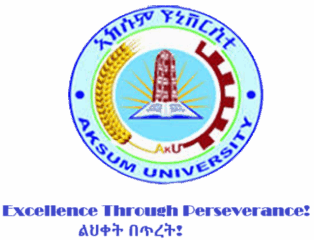🌍 Institute of Archaeology and Tourism Administration
Welcome to the Institute of Archaeology and Tourism at Aksum University! Nestled in a region rich with historical and cultural heritage, our institute is dedicated to exploring, preserving, and promoting the archaeological wonders and tourism potential of Ethiopia. Our committed team ensures a dynamic learning environment, fosters excellence in research, and contributes to sustainable tourism development.
We’re committed to:
- Leading research in archaeology and heritage management
- Developing skilled professionals for the tourism sector
- Promoting responsible tourism and cultural preservation
We collaborate closely with our faculties, staff, local communities, governmental bodies (like the Authority for Research and Conservation of Cultural Heritage), and international organizations to advance archaeological understanding, conserve heritage sites, and enhance sustainable tourism. All our efforts are aligned with Ethiopia’s cultural development goals, tourism market demands, and the preservation of its invaluable past.
👤 Administrative Structure – Click to Learn More!
Explore the key roles within our leadership team:
Provides overall leadership and strategic direction for the Institute, promoting its vision in archaeological research, heritage conservation, and tourism development.
Oversees all academic programs, curriculum development, and quality assurance across the Institute’s various departments, ensuring high educational and research standards.
Prepares and monitors the Institute’s budget and expenditures, ensuring efficient resource allocation for archaeological digs, heritage conservation projects, academic programs, and administrative needs.
Handles recruitment, staff welfare, and general administrative services within the Institute, supporting a collaborative and efficient work environment.
Supports archaeological expeditions, heritage preservation initiatives, fosters collaborations with cultural institutions and local communities, and coordinates outreach programs focused on tourism development and cultural awareness.
Ensures that academic standards and program quality are met and maintained across all departments, focusing on practical skills development in archaeology, tourism, and heritage management, and adherence to international best practices.
Roles and Responsibilities
🎓 Academic Management – Explore Our Departments!
The Institute of Archaeology and Tourism offers a wide array of undergraduate and postgraduate programs designed to equip students with specialized knowledge and practical skills in discovering, managing, and promoting cultural and natural heritage. Click on a department to learn more:
- B.A. in Archaeology
- B.A. in Heritage Management
- M.A. in Archaeology and Heritage Management
- B.A. in Tourism Management
- B.A. in Hotel Management
- M.A. in Sustainable Tourism Development
- B.A. in History
- M.A. in Heritage Studies
- (Specific programs may vary based on curriculum)
- B.A. in Anthropology
- M.A. in Social Anthropology
- (Specific programs may vary based on curriculum)
Key Academic Responsibilities:
- Coordinating program development, ensuring alignment with national heritage conservation policies, tourism strategies, and international archaeological standards.
- Managing course scheduling and faculty assignments to optimize theoretical learning and practical fieldwork experiences.
- Supervising curriculum review, development, and accreditation processes to ensure quality, innovation, and industry relevance in archaeology and tourism.
- Supporting faculty development, promoting research in heritage studies and tourism, and evaluating performance.
- Managing student admissions, academic records, and graduation processes in coordination with university-level offices.
💼 Administrative Operations
- Developing and managing the Institute’s annual budget in line with university policies and strategic priorities, particularly for research grants, archaeological excavations, site conservation, and tourism promotional activities.
- Overseeing procurement, infrastructure development (e.g., conservation labs, ethnographic museums, tourism training facilities), and efficient resource utilization for academic, research, and administrative needs across all departments.
- Implementing university-wide administrative policies and procedures to ensure smooth operations and compliance.
- Facilitating effective communication and collaboration between departments and with external partners, including cultural heritage organizations and tourism boards.
👥 Student Services
- Assisting students with academic advising, course selection, and registration processes, including guidance on fieldwork, internships in tourism and heritage sites, and thesis projects.
- Organizing student orientations, career guidance (e.g., in archaeology, museum management, tour guiding, hotel operations, cultural resource management), and extensive opportunities for practical industry exposure.
- Addressing student concerns, promoting student welfare, and fostering an inclusive and supportive learning environment that encourages critical thinking, cultural appreciation, and ethical practices in heritage and tourism.
- Supporting student organizations and extracurricular activities related to archaeology, history, anthropology, and tourism.
🔬 Research and Community Engagement
- Encouraging staff and student-led research in areas critical to archaeological discovery, heritage preservation, and sustainable tourism development in Ethiopia, especially focusing on the Aksumite civilization and other historical sites in Tigray.
- Establishing strong partnerships with various government bodies (e.g., Ministry of Culture and Tourism), local communities, NGOs, and international organizations (e.g., UNESCO) to foster collaborative research, provide consultancy on heritage matters, and facilitate knowledge transfer.
- Hosting archaeological field schools, heritage conservation workshops, tourism forums, public lectures, and outreach programs that contribute to public awareness of Ethiopia’s rich past and the importance of responsible tourism.
- Facilitating the publication and dissemination of research findings to inform policy, conservation efforts, and tourism practices.
